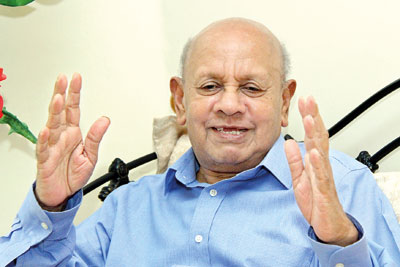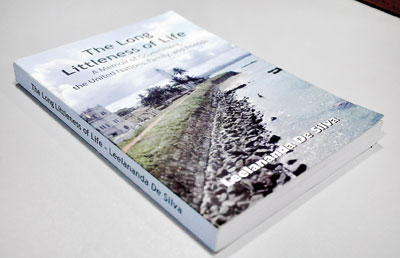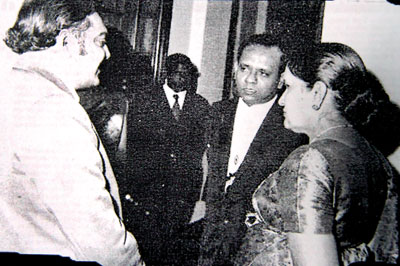A life peppered with well known names and places

Author Leelananda De Silva. Pic by Indika Handuwala
A circuit bungalow, just two Heads of State and an earnest plea: “Yanna epa – maath ekka inna.”
This and much more have been packed within the covers of ‘The Long Littleness of Life – A Memoir of Government, the United Nations, Family and Friends’ by Leelananda De Silva, 80, not only about the time he worked closely and was the travelling companion of the first woman Prime Minister of then Ceylon and first woman head of government in the world, Sirimavo Bandaranaike, but also documenting his experiences during a working life spanning 50 years.
The plea by Mrs. Bandaranaike, usually seen as tough-talking and at that time dubbed ‘the only man’ in the Cabinet had been made to Mr. De Silva when they were on a visit to the Philippines and is recounted during a pleasant morning spent at his home down Layard’s Road, Colombo 5, a few weeks ago.
Mrs. Bandaranaike had sailed on the yacht of President Ferdinand and Imelda Marcos to Bataan–the area of bitter fighting between the Japanese and the Americans during World War II (WW II), — the site of a museum and a circuit bungalow. Mrs. Bandaranaike’s entourage had been drawn to the museum, leaving her alone with President Marcos. Hence, the plea in Sinhala……not to leave, but stay with her, to Mr. De Silva.
Fond are his memories of Mrs. Bandaranaike who had two ministerial portfolios under her, while she was PM, whom he considers “one of the finest ministers”. She hardly got irritated and did not interfere in the weekly meetings where most matters were discussed but was a stickler for detail, while her forte was foreign affairs. With a strong belief that both politicians and officials had their own important roles to play, she had once told a Deputy Minister to keep from interfering in matters being handled by officials.
Among the many official events organised by Mr. De Silva, were the 30th annual sessions of the Economic Commission for Asia and the Far East/Economic and Social Commission for Asia and the Pacific (ECAFE/ESCAP), as its Secretary-General, the first-ever conference to be held at the newly-built Bandaranaike Memorial International Conference Hall (BMICH) in Colombo, way back in 1974. Early, on the morning of the conference, his home telephone had rung, a call from none other than Mrs. Bandaranaike herself who was to put forward a far-reaching proposal on fertilizer. Glancing through the newspapers that morning which were carrying photographs of the venue, it had dawned on her that there was no lectern for her opening speech. Rushing this vital piece of equipment to the hall, they had been able to prevent the humiliation of the host-country.
Another momentous conference not just for the then government but for Sri Lanka was the 5th Non-Aligned Summit in August 1976 where distinguished Heads of State gathered. Mr. De Silva had played a key role as the Secretary of the Economic Committee in the four years leading up to the summit.
It is with a smile that Mr. De Silva recalls how he had seen Justin Trudeau, the current Prime Minister of Canada, as a little boy when he had accompanied his father, Pierre and mother, Margaret, to the Kingston meeting of the Commonwealth Heads of Government in Jamaica in 1975.
Numerous also are the eminent leaders worldwide he has met including Indira Gandhi of India, Josip Tito of Yugoslavia, Queen Elizabeth II and Harold Wilson of Britain, Julius Nyerere of Tanzania and Emperor Hirohito of Japan.
Mr. De Silva’s memoirs, meandering through three parts reflect the history of those times……his childhood, school days, university and the first decade of his working life serving the government at the grassroots; followed by seven years where he contributed much, playing an important and decision-making role in the Planning and Economic Affairs Ministry which he considers the “high noon” of his career; and finally gives a long glimpse into the next 40 years where he served the United Nations, not as a staff member but as a “self-employed” international consultant, “a career of chance with no way to plan it”.
Mr. De Silva’s childhood was spent in Ahangama, with the early lessons in four English village schools around Koggala. Those were the days of WW II, with then Ceylon very much a part of it. A wealthy landowner, his grandfather had coconut properties in Ahangama and cinnamon in the interior, citronella in Beliatte and tea in Haputale. They also had a big transport business in Haputale.
Around 60 families, all relatives, were spread across four villages and the social life was “hectic” what with all the danes (alms-givings) and Vesak and New Year celebrations. The sea was ever-present in their lives, with the sight of the fishing boats coming home each evening about a quarter mile away being very much a part of the landscape. “They brought in every kind of fish – big and small fry, balayas, thoras and also hurrullas and salayas, and I could identify them from the time I was very young,” he laughs.

While the physical landscape was filled by the beauty of the village and the never-still sea, the mental landscape went beyond the usual horizons, opening out vistas due to the love of reading, writing and poetry passed onto Mr. De Silva by his father. He reminisces how as a child he was “mad” about Sherlock Holmes.
Politics was an integral part of the clan, with his father’s second cousin, Montague Jayawickrama first dabbling in local government and then parliamentary elections, entering Parliament in 1947 just before Ceylon gained independence. The extended family was all die-hard United National Party supporters but party politics or for that matter racial or religious differences did not cause any rifts and friendships were strong among all communities and religions. With his grandfather relying heavily on the tea industry for his prosperity in the transport business, they were also very pro-British.
From the village schools, Mr. De Silva moved to Mahinda College, a Buddhist school which, however, followed the Woodward tradition (Principal F.L. Woodward) – a lovely blend of east and west, learning Pali, Sanskrit and Sinhala on one hand and Greek, Latin and English on the other. The teachers were a mix of Sinhalese and Tamils, who inculcated in their students the crystal clear difference between right and wrong. The added bonus at Mahinda College was its library, which was a treasure-trove of books.
An indelible mark on the mind of young Leelananda was left by the “great” teacher of English, Cadmus Samarasinghe, about whom Mr. De Silva speaks with reverence stating that he is still alive, while the love of cricket was set aflame by Gamini Punchihewa, a relative.
War-time added a different texture to life and he recalls how the wide-eyed children, himself included, would see British soldiers bunkering at Koggala and Ahangama, cycling past, waving cheerily at them, to pick up their mail from the Post Office.
Life followed the usual course for Leelananda, who entered university to secure a degree in economics, with the final results being “brilliant in some parts” and not so brilliant in others. His father was keen for him to work in government and thus he began his career as a District Land Officer, serving in the “interesting” districts of Anuradhapura, Hambantota and Jaffna and the “routine” district of Kurunegala. The colonization schemes of the early 1960s in Anuradhapura and Hambantota are still etched in his mind, where he himself undertook to settle 400 families in arid, bone-dry stretches of land between Tissamaharama and Kataragama, who had to be provided water by bowser. He is still unsure whether “it was good or bad”.
Jaffna was a different scenario, with tension during office hours with the Satyagraha (in the early 1960s) marring his stay there, but a super social life with the Government Agent and lots of lovely wine from the Tholakatti farm in the evening.
His last seven years in government service, as Senior Assistant Secretary and Director of Economic Affairs of the important Planning and Economic Affairs Ministry read like a snapshot of the history of that era – engaging in domestic issues which included assisting Premier Bandaranaike in managing Cabinet business and preparing a Note for her Cabinet agenda and managing the country’s economic links with the United Nations (UN), the Commonwealth and the Non-Aligned Movement, when north-south tensions were running high. His memoirs describe in detail his role in managing the takeover of sterling company estates (200,000 acres with £ 42.50 being paid for an acre following much research on pricing even from the London Stock Exchange), looking into brain-drain and formulating policies (with the Cabinet for once making decisions on research-based evidence) and having under his purview two UN technical assistance projects and serving on many Boards of Corporations.

Prime Minister Sirimavo Bandaranaike chatting with Ambassador Faisal Junaid (far right) and Mr. De Silva (centre) in Baghdad, Iraq in 1975
What Mr. De Silva considers “unique” and most probably a world record, however, is the time he worked as an independent consultant with no institutional base. Crisscrossing the world during 150 wide and varied assignments over 35 years (garnering more than two million air-miles, a record by itself), for UN agencies such as UNDP, UNCTAD, ITC, FAO, IFAD, ESCAP and many more and also being based sometimes in New York in the United States of America, Windsor in England (where he had many a glimpse of Queen Elizabeth II, though from afar), Geneva in Switzerland, Rome in Italy, Vienna in Australia and Bangkok in Thailand.
“North Korea was the most miserable government in the world,” he says, adding that the masses were under a ruthless dictatorship. “You couldn’t even take a stroll in the evening and if you wished to have an egg for breakfast, the order would have to be given many days in advance.”
What of the future, we ask Mr. De Silva, and the prompt reply is that he will keep reading and writing, while he enjoys his retirement from an “unusual” job along with his wife Rukmal, travelling around the country as well as the world and making visits to their one-and-only daughter, Amali, who is an accountant in Vancouver, Canada.
‘The Long Littleness of Life’ (a phrase Mr. De Silva had picked up after reading a letter by Frances Cornford, the wife of a Cambridge don and granddaughter of Charles Darwin, in the 1930s) is peppered with names and places. It is a must-read, for you may find your name there too.
(‘The Long Littleness of Life’ priced at Rs. 1,000 is available at Barefoot, Colombo 3, and Vijitha Yapa Bookshops)


